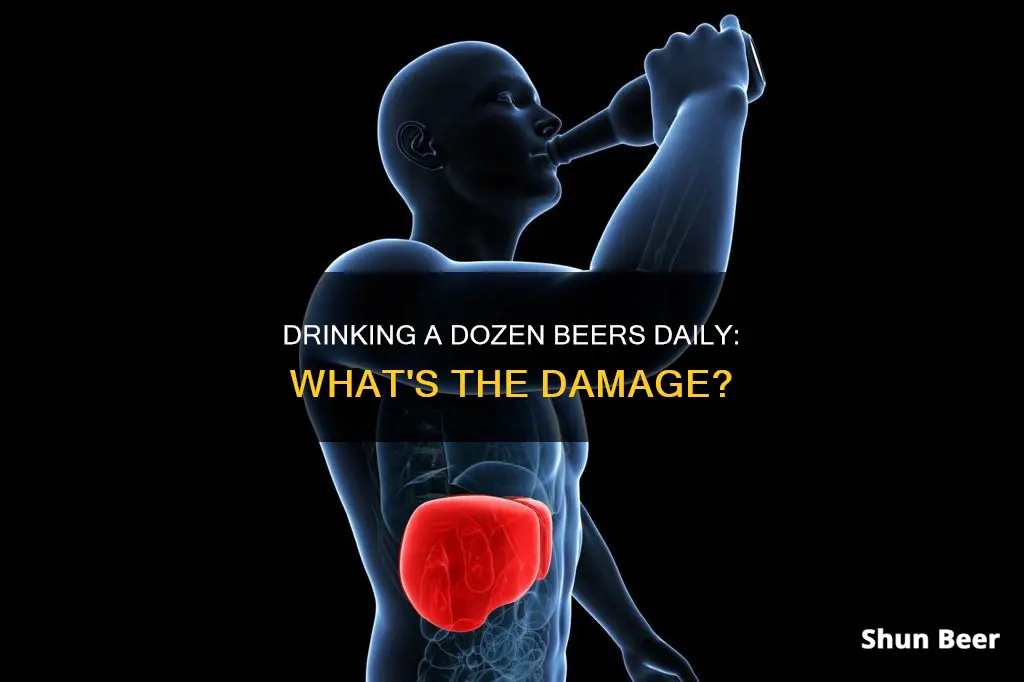
Drinking 12 beers a day can have severe negative consequences for a person's health and longevity. Excessive alcohol consumption can lead to liver damage, high blood pressure, heart disease, certain types of cancer, and nutritional deficiencies. It can also impair cognitive function, increase the risk of mental health issues such as depression and anxiety, and negatively impact social relationships and quality of life. Furthermore, binge drinking patterns and heavy drinking over time can lead to alcohol use disorder (AUD) and severe health problems. Understanding the risks associated with drinking 12 beers a day is crucial for individuals concerned about their well-being.
| Characteristics | Values |
|---|---|
| Liver damage | Inflammation, fatty liver disease, cirrhosis |
| Increased risk of chronic diseases | Heart disease, high blood pressure, certain types of cancer |
| Nutritional deficiencies | Lack of vitamins, minerals and other nutrients |
| Impaired cognitive function | Difficulties with memory, concentration and decision-making |
| Mental health issues | Increased risk of depression, anxiety and suicidal thoughts |
| Relationship and social consequences | Strained relationships, isolation, decline in social well-being |
| Financial consequences | Cost of purchasing 12 beers a day, impulsive spending habits |
| Legal and safety concerns | Increased risk of engaging in risky behaviours, drunk driving |
What You'll Learn

Liver damage
Drinking 12 beers a day can have serious consequences for your health and can lead to liver damage. The liver plays a critical role in filtering toxins, including alcohol, from the body. However, when exposed to excessive alcohol levels, the liver can become overburdened and unable to function properly.
Excessive beer consumption can lead to liver cirrhosis, which is a severe and irreversible form of liver damage. Liver cirrhosis is caused by the development of fibrosis and scarring, resulting in permanent liver cell death. Patients with cirrhosis have very high mortality rates, and a liver transplant may be required as the condition is largely irreversible.
Another consequence of heavy beer consumption is alcoholic hepatitis, which refers to acute injury to the liver cells. While it can sometimes resolve on its own with supportive care, alcoholic hepatitis can also worsen and lead to liver failure and death. Therefore, careful monitoring is necessary.
Alcoholic fatty liver disease is another type of liver damage that can occur. Even a few days of heavy drinking can cause this form of liver disease. It is often asymptomatic and reversible with alcohol cessation. However, doctors can detect it through ultrasound or CT scans.
The amount of alcohol considered safe varies from person to person, depending on factors such as age, gender, weight, and overall health. Generally, moderate drinking is defined as one drink per day for women and up to two drinks per day for men. Drinking more than this on a regular basis is considered heavy drinking and can have detrimental effects on both physical and mental health.
It is important to note that the development of liver damage due to alcohol consumption can vary among individuals. While some people may develop liver damage quickly, others may take a longer time or even not develop it at all, regardless of their alcohol intake. However, the longer and heavier the drinking, the higher the likelihood of liver damage.
Homework vs Beer: The Battle for Attention
You may want to see also

Increased risk of chronic diseases
Drinking 12 beers a day is classified as heavy drinking and can have severe implications for one's overall health and well-being. It is associated with an increased risk of developing chronic diseases, which can significantly shorten life expectancy. Here are some ways in which heavy beer consumption can negatively impact an individual's health:
Cardiovascular Problems
Heavy beer consumption is linked to an increased risk of cardiovascular issues such as heart disease, cardiomyopathy, irregular heart rhythms, and high blood pressure. These conditions can have detrimental effects on heart health and overall well-being, impacting life expectancy.
Certain Types of Cancer
Excessive alcohol intake, such as drinking 12 beers a day, is associated with a higher risk of developing specific types of cancer. This includes liver, mouth, throat, esophageal, and breast cancer. The relative risk of developing breast cancer is particularly elevated for females who consume large amounts of alcohol.
Gastrointestinal Disorders
Heavy beer drinking can lead to gastrointestinal disorders and other digestive issues. This includes conditions such as alcoholic hepatitis, cirrhosis, and fatty liver disease, which can impair liver function and overall health. Additionally, heavy drinking is associated with ulcers and other gastrointestinal problems.
Nutritional Deficiencies
Beer contains empty calories and lacks essential nutrients. When consumed in excess, it can lead to nutritional deficiencies, including vitamin B12 and magnesium deficiencies. These deficiencies can have adverse effects on overall health and well-being.
Mental Health Disorders
Chronic heavy alcohol consumption is associated with an increased risk of developing mental health disorders, including depression and anxiety. These conditions can significantly impact an individual's quality of life and well-being. Heavy drinking can also lead to cognitive impairment, memory loss, and Wernicke-Korsakoff syndrome, which is caused by a thiamine (vitamin B1) deficiency.
The consequences of heavy beer consumption on chronic disease risk are far-reaching and can have long-lasting impacts on overall health and longevity. It is crucial to prioritize moderation and seek professional help if struggling with alcohol consumption to mitigate these risks and improve long-term health outcomes.
Beer and Work: Can Companies Ban Alcohol?
You may want to see also

Nutritional deficiencies
Drinking 12 beers a day can lead to nutritional deficiencies, causing a range of adverse health effects. Beer contains calories but lacks essential vitamins and minerals, leading to inadequate intake when consumed in excess. This can result in vitamin B12 and magnesium deficiencies, increasing the risk of developing conditions such as Wernicke-Korsakoff syndrome, a severe brain disorder associated with thiamine (vitamin B1) deficiency. Nutritional deficiencies can have far-reaching consequences for overall health and can exacerbate pre-existing health issues.
The excessive consumption of beer can also contribute to weight gain. A single light beer contains an average of 130 calories, and a 12-pack of light beer can add up to an additional 1,560 calories per day, equivalent to three-fourths of the recommended daily intake. This can lead to drastic weight gain over time.
Furthermore, drinking 12 beers a day can negatively impact eating habits, often leading to poor dietary choices and a higher risk of obesity. The impact of beer consumption on nutritional deficiencies and overall health underlines the importance of moderation and responsible drinking.
Steve Austin's Beer Choice: What Did He Drink?
You may want to see also

Impaired cognitive function
Drinking 12 beers a day can have a detrimental impact on cognitive function, leading to difficulties in several areas. Firstly, it can cause issues with memory, including blackouts or periods of amnesia where drinkers cannot remember events that occurred while intoxicated. Regular heavy drinking can also lead to long-term memory impairment and an increased risk of developing dementia later in life.
Secondly, excessive alcohol consumption can affect concentration, making it challenging for individuals to focus on tasks and potentially resulting in poor performance at work or school. This can lead to decreased efficiency, poor academic performance, and even jeopardise one's job or educational goals.
Thirdly, decision-making abilities can become impaired, with individuals experiencing slower reaction times and decreased coordination. This can increase the risk of accidents and injuries and lead to poor choices such as drunk driving or engaging in illegal activities.
Finally, heavy drinking can also contribute to the development or worsening of mental health issues, such as depression and anxiety. Alcohol is a depressant that can exacerbate existing feelings of sadness, anxiety, and stress, further impairing cognitive function.
Drinking Three Beers Daily: Damaging Your Health?
You may want to see also

Mental health issues
Drinking 12 beers a day can have serious consequences for your mental health. Alcohol is a depressant, and excessive consumption can lead to a higher risk of developing mental health disorders such as depression and anxiety. It can also exacerbate pre-existing mental health conditions and contribute to the development of new ones. The relationship between alcohol and mental health is complex and often creates a vicious cycle, where alcohol is used as a coping mechanism but ultimately worsens mental well-being.
Cognitive impairment is another immediate effect of heavy alcohol consumption. Alcohol affects the brain by interfering with neurotransmitters, resulting in slower reaction times, impaired coordination, and difficulty in making decisions. This can impact daily tasks, work performance, and overall cognitive abilities. Prolonged heavy drinking can also contribute to long-term cognitive decline and an increased risk of developing conditions such as dementia.
Excessive drinking can also lead to behavioural changes, such as aggression and irritability, which can strain personal relationships and lead to social isolation. Additionally, the prioritisation of drinking over social activities and responsibilities can further impact an individual's quality of life and sense of well-being.
Andre's Beer Challenge: How Many Can He Handle?
You may want to see also
Frequently asked questions
Yes, drinking 12 beers a day is considered excessive and can have serious negative impacts on your health and longevity. This level of consumption is well above the threshold for heavy drinking and can lead to liver disease, high blood pressure, stroke, and an increased risk of certain types of cancer.
Excessive alcohol consumption can negatively impact your relationships and social interactions. It may lead to conflicts, isolation, and a decline in your overall quality of life. Drinking 12 beers a day can also increase the risk of domestic violence and put a strain on your personal and professional life.
Heavy drinking is associated with an increased risk of mental health issues such as depression, anxiety, and cognitive impairment. It can also lead to social and relationship problems, further impacting your overall mental well-being.







